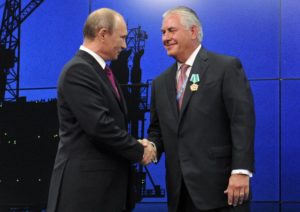PresidSpecial to WorldTribune.com
Radio Free Europe / Radio Liberty
U.S. Secretary of State Rex Tillerson has said ahead of a visit to Moscow that Russia must choose whether it will side with the United States on Syria or continue to be aligned with Syrian President Bashar al-Assad, Iran, and the Iran-backed Lebanese militant group Hizballah.

Tillerson made the remarks in Lucca, Italy, on April 11 after foreign ministers from the Group of Seven (G7) developed countries met with Middle Eastern allies to discuss the conflict in Syria.
Tillerson spoke before embarking for Russia, where he is to meet with Foreign Minister Sergei Lavrov on April 12.
He said it was unclear whether Russia — which has backed Assad throughout the six-year-old war — had failed to take seriously its obligation to rid Syria of chemical weapons or if had merely been incompetent.
But Tillerson said the distinction “doesn’t much matter to the dead.”
“We cannot let this happen again,” he said, referring to allegations that Assad ordered a nerve-gas attack last week on a rebel-held town. “We want to relieve the suffering of the Syrian people.”
“Russia can be a part of that future and play an important role,” Tillerson continued. “Or Russia can maintain its alliance with this group, which we believe is not going to serve Russia’s interests longer term.”
At the G7 talks on April 11, the ministers were divided on tougher measures to pressure Russia over its support of Assad.
Tillerson said after the meeting that the priority in Syria and Iraq remained the defeat of Islamic State extremists. But he said Moscow should realign with the United States and others toward that goal.
Russia’s Foreign Ministry said in a statement that it hoped Lavrov would have “productive talks” with Tillerson.
It said the outcome of their Moscow meeting was important not only for the Russia-U.S. relationship, but “for the overall atmosphere on the world stage.”
Britain and Canada have both said sanctions could be tightened against Russia if the Kremlin continues to support Assad’s government.
French Foreign Minister Jean-Marc Ayrault said the time has come for Russia to end the “hypocrisy” of its support for Assad.
“We say to the Russians,” Ayrault said. “Grab this opportunity to distance yourselves from the horror of the regime of Bashar al-Assad and finally show with sincerity that you want peace.”
Italian Foreign Minister Angelino Alfano said after chairing the G7 meeting that the ministers agreed there could be no military solution for Syria, and Russia must “insofar as possible” be involved in peace efforts.
“We do not believe that the military solution is the right one,” Alfano said.
German Foreign Minister Sigmar Gabriel said Russia and Iran must both be involved in Syria’s peace process. “Not everyone may like it, but without Moscow and without Tehran there will be no solution for Syria,” he said.
Gabriel also said that Tillerson had focused on diplomatic initiatives during the April 11 talks in Lucca. “Tillerson explicitly said they are seeking a nonviolent, nonmilitary way,” he said, praising Tillerson for taking “a very realistic and clear stance.”
The need to engage with Russia also was echoed by Japanese Foreign Ministry spokesman Masato Ohtaka, who said Russia “can play a key role.”
Also attending the G7 meeting on April 11 were the foreign ministers from five countries near Syria that oppose Assad’s rule — Turkey, Saudi Arabia, the United Arab Emirates, Jordan, and Qatar.
Diplomatic pressure on Russia has been growing since April 4, when the alleged chemical air strike by Russian-backed Syrian forces killed more than 80 people in the rebel-held town of Khan Sheikhoun in Idlib Province.
Moscow and Damascus claim that the deadly gas was released when strikes by government forces hit a rebel weapons depot, an assertion the United States and others reject.
The United States on April 7 fired dozens of cruise missiles at a Syrian air base that Washington says was the launch site for the attack.
That has drawn condemnation from Russia and Iran, which have given Assad crucial diplomatic and military support throughout the war.
